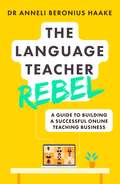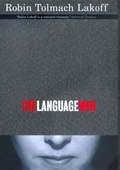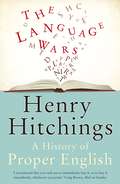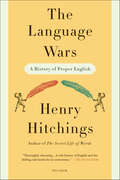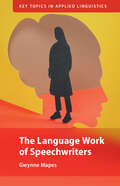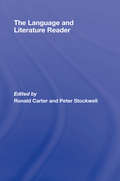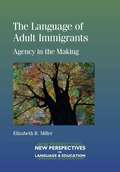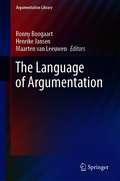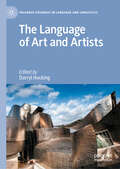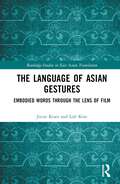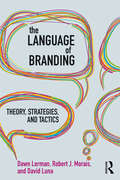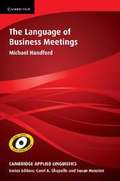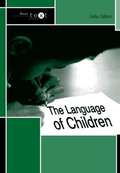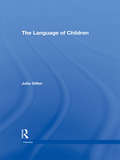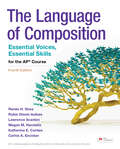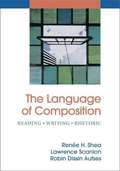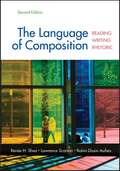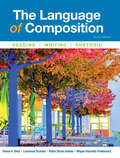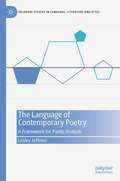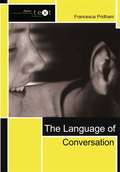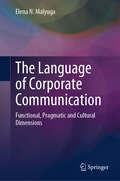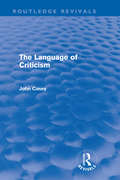- Table View
- List View
The Language Teacher Rebel: A guide to building a successful online teaching business
by Anneli Beronius HaakeDo you want to start teaching a language online, be your own boss and be able to work from anywhere that has wifi? Do you want to make a difference in the world by using your language skills to empower people and give them the confidence they need to develop? This timely book covers everything needed to set up a successful online language teaching business, from creating the right mindset, tech and marketing, to designing products and services, finding students online, growing your business and more. More than a manual, it is also a rallying call for language teachers - or language teacher rebels - to share cultural values beyond the traditional classroom and encourage integration on a worldwide scale. An accompanying Language Teacher Rebel Toolkit, containing a comprehensive set of editable, effective and time-saving templates for all the essential documents needed to set up and run an online language teaching business, is available for sale at library.teachyourself.com. Including planners, email scripts and financial templates, this toolkit has everything you need to get organised and get teaching.
The Language Teacher Rebel: A guide to building a successful online teaching business
by Anneli Beronius HaakeDo you want to start teaching a language online, be your own boss and be able to work from anywhere that has wifi? Do you want to make a difference in the world by using your language skills to empower people and give them the confidence they need to develop? This timely book covers everything needed to set up a successful online language teaching business, from creating the right mindset, tech and marketing, to designing products and services, finding students online, growing your business and more. More than a manual, it is also a rallying call for language teachers - or language teacher rebels - to share cultural values beyond the traditional classroom and encourage integration on a worldwide scale. An accompanying Language Teacher Rebel Toolkit, containing a comprehensive set of editable, effective and time-saving templates for all the essential documents needed to set up and run an online language teaching business, is available for sale at library.teachyourself.com. Including planners, email scripts and financial templates, this toolkit has everything you need to get organised and get teaching.
The Language War
by Robin Tolmach LakoffAre there natural boundaries to our field? How do we differ (if we do) from rhetoricians, literary critics, psychoanalysts, appellate courts, political spin doctors, and others who, theoretically and practically, determine what language means or accomplishes?
The Language Wars: A History Of Proper English
by Henry HitchingsThe English language is a battlefield. Since the age of Shakespeare, arguments over correct usage have been acrimonious, and those involved have always really been contesting values - to do with morality, politics and class. THE LANGUAGE WARS examines the present state of the conflict, its history and its future. Above all, it uses the past as a way of illuminating the present. Moving chronologically, the book explores the most persistent issues to do with English and unpacks the history of 'proper' usage. Where did these ideas spring from? Which of today's bugbears and annoyances are actually venerable? Who has been on the front line in the language wars? THE LANGUAGE WARS examines grammar rules, regional accents, swearing, spelling, dictionaries, political correctness, and the role of electronic media in reshaping language. It also takes a look at such niggling concerns as the split infinitive, elocution and text messaging. Peopled with intriguing characters such as Jonathan Swift, H. W. Fowler and George Orwell as well as the more disparate figures of Lewis Carroll, Buffy the Vampire Slayer and Lenny Bruce, THE LANGUAGE WARS is an essential volume for anyone interested in the state of the English language today or intrigued about its future.
The Language Wars: A History of Proper English
by Henry HitchingsThe English language is a battlefield. Since the age of Shakespeare, arguments over correct usage have been bitter, and have always really been about contesting values-morality, politics, and class. The Language Wars examines the present state of the conflict, its history, and its future. Above all, it uses the past as a way of illuminating the present. Moving chronologically, the book explores the most persistent issues to do with English and unpacks the history of "proper" usage. Where did these ideas spring from? Who has been on the front lines in the language wars?The Language Wars examines grammar rules, regional accents, swearing, spelling, dictionaries, political correctness, and the role of electronic media in reshaping language. It also takes a look at such details as the split infinitive, elocution, and text messaging. Peopled with intriguing characters such as Jonathan Swift, Lewis Carroll, and Lenny Bruce, The Language Wars is an essential volume for anyone interested in the state of the English language today or its future.
The Language Work of Speechwriters (Key Topics in Applied Linguistics)
by Gwynne MapesThe work of speechwriters is prominent in political discourse, yet the writers themselves remain in the shadows of the powerful, public figures they work for. This book throws the spotlight on these invisible wordsmiths, illuminating not only what they do, but also why it matters. Based on ethnographic research in the US American speechwriting community, it investigates the ways in which speechwriters talk about their professional practices, and also the material procedures which guide the production of their deliverables. Relying on a robust collection of various genres of discursive data, Mapes focuses on the primary rhetorical strategies which characterize speechwriters' discourse, neatly exposing how they are beholden to a linguistic marketplace entrenched in ideological and socioeconomic struggle. Providing fascinating insights into an understudied and relatively misunderstood profession, this book is essential reading for academic researchers and students in applied linguistics, discourse studies, linguistic and cultural anthropology, and sociolinguistics.
The Language and Literature Reader
by Ronald CarterThe Language and Literature Reader is an invaluable resource for students of English literature, language, and linguistics. Bringing together the most significant work in the field with integrated editorial material, this Reader is a structured and accessible tool for the student and scholar.Divided into three sections, Foundations, Developments and New Directions, the Reader provides an overview of the discipline from the early stages in the 1960s and 70s, through the new theories and practices of the 1980s and 90s, to the most recent and contemporary work in the field. Each article contains a brief introduction by the editors situating it in the context of developing work in the discipline and glossing it in terms of the section and of the book as a whole. The final section concludes with a ‘history and manifesto’, written by the editors, which places developments in the area of stylistics within a brief history of the field and offers a polemical perspective on the future of a growing and influential discipline.
The Language of Adult Immigrants
by Elizabeth R. MillerThis book is the first to explore the constitution of language learner agency by drawing on performativity theory, an approach that remains on the periphery of second language research. Though many scholars have drawn on poststructuralism to theorize learner identity in non-essentialist terms, most have treated agency as an essential feature that belongs to or inheres in individuals. By contrast, this work promotes a view of learner agency as inherently social and as performatively constituted in discursive practice. In developing a performativity approach to learner agency, it builds on the work of Vygotsky and Bakhtin along with research on 'agency of spaces' and language ideologies. Through the study of discourses produced in interviews, this work explores how immigrant small business owners co-construct their theories of agency, in relation to language learning and use. The analysis focuses on three discursive constructs produced in the interview talk-subject-predicate constructs, evaluative stance, and reported speech-and investigates their discursive effects in mobilizing ideologically normative, performatively realized agentive selves.
The Language of Argumentation (Argumentation Library #36)
by Henrike Jansen Ronny Boogaart Maarten Van LeeuwenBringing together scholars from a broad range of theoretical perspectives, The Language of Argumentation offers a unique overview of research at the crossroads of linguistics and theories of argumentation.In addition to theoretical and methodological reflections by leading scholars in their fields, the book contains studies of the relationship between language and argumentation from two different viewpoints. While some chapters take a specific argumentative move as their point of departure and investigate the ways in which it is linguistically manifested in discourse, other chapters start off from a linguistic construction, trying to determine its argumentative function and rhetorical potential. The Language of Argumentation documents the currently prominent research on stylistic aspects of argumentation and illustrates how the study of argumentation benefits from insights from linguistic models, ranging from theoretical pragmatics, politeness theory and metaphor studies to models of discourse coherence and construction grammar.
The Language of Art and Artists (Palgrave Advances in Language and Linguistics)
by Darryl HockingThis book brings together the research of leading scholars who explore the complex interplay between language and art. Employing a diversity of methods—including systemic functional linguistics, corpus analysis, multimodal analysis, genre analysis, discourse analysis, and cognitive linguistics—this edited collection offers fresh perspectives on the role of textual practices in shaping artistic production, interpretation, and engagement across a range of cultural and institutional contexts. The chapters examine a wide range of written and spoken texts, including artists&’ statements, art reviews, painting titles, museum press releases, artists&’ websites, guided tours, audio descriptions, and artist talks. This timely volume is relevant for students, teachers, and researchers in language and applied linguistics, discourse analysis and visual arts, as well as those in the areas of art theory and curatorial studies. It will also appeal to academic literacies and ESP (English for Specific Purposes) practitioners supporting visual arts students worldwide.
The Language of Asian Gestures: Embodied Words Through the Lens of Film (Routledge Studies in East Asian Translation)
by Jieun Kiaer Loli KimThe Language of Asian Gestures explores Asian gestures as a non-verbal language within the context of films and dramas.This book provides a cross-cultural Asian perspective on a range of important common gestures and their meanings, covering a range of Asian regions including Korea, China, Hong Kong, Japan, Taiwan, Vietnam, Singapore, Thailand, Indonesia, the Philippines, India, and Pakistan. While most studies focus on text-based communication, gestures find themselves overshadowed by text and speech. Asian gestures, too, often reside in the shadow of Eurocentric viewpoints. This book will shift this dynamic and amplify the voices that have typically been marginalised within 20th-century Eurocentric discussions.The book will be informative for students and researchers interested in Asian languages, cultures, film studies, and pragmatics. It bridges the gap between words and gestures, unveiling a world of concealed meanings and enriching our understanding of diverse forms of expression.
The Language of Branding: Theory, Strategies, and Tactics
by Dawn Lerman Robert J. Morais David LunaThe Language of Branding: Theory, Strategies and Tactics shows marketers how to use language successfully to improve brand value and influence consumer behavior. Luna and Lerman are among only a few researchers who take a multidisciplinary perspective on the ways language influences how consumers act. Together with Morais, an anthropologist engaged in market research, they show how understanding the power of language can impact the essence – and sales – of a brand. The book covers the fundamentals of brand language and applications for an array of marketing initiatives. Readers will learn why brand language matters, how language is used in marketing, and how to build a brand strategy that capitalizes on the richness and complexity of language. This book includes real-world case histories that demonstrate vividly how brand language is created and exercises that enable both students of marketing and marketing professionals to apply the book’s concepts and stimulate class discussion. The Language of Branding: Theory, Strategies and Tactics can be used in a number of courses, including consumer behavior, branding, advertising, linguistics, and communications.
The Language of Business Meetings
by Michael HandfordThis innovative volume presents an in-depth study of the language used by participants in business meetings. The cutting-edge research draws on the Cambridge and Nottingham Business English Corpus (CANBEC), a unique resource which brings together meetings of different types both within and between companies, involving speakers whose roles and responsibilities vary, and who represent a range of nationalities and first languages. Keywords, concordance lines and discourse analysis provide thorough insights into aspects such as the structural stages of meetings, participants' discursive practices, interpersonal language and creativity, and power and constraint. The author concludes by making practical suggestions for using these findings to inform the teaching of business English.
The Language of Children
by Julia GillenThe Intertext series has been specifically designed to meet the needs of contemporary English language studies. Working with Texts: A Core Introduction to Language Analysis (second edition, 2001) is the foundation text, which is complemented by a range of satellite titles. These provide students with hands-on practical experience of textual analysis through special topics and can be used individually or in conjunction with Working with Texts.
The Language of Children (Intertext)
by Julia GillenThe Intertext series has been specifically designed to meet the needs of contemporary English Language Studies. Working with Texts: A Core Introduction to Language Analysis (second edition, 2001) is the foundation text, which is complemented by a range of 'satellite' titles. These provide students with hands-on practical experience of textual analysis through special topics and can be used individually or in conjunction with Working with Texts.The Language of Children: introduces the key theories of language acquisition and provides a historical overview of the subject looks at all the ways children learn to communicate, from writing and talking to playing and using computers includes a wide variety of real texts and data, from records of childrens first words to children's hand-written stories and emails explores the language of children from a range of backgrounds and abilities, including deaf and bilingual children is user-friendly and accessible, and provides a full glossary.
The Language of Composition: Essential Voices, Essential Skills for the AP® Course
by Lawrence Scanlon Robin Aufses Renee Shea Carlos Escobar Megan Harowitz Katherine CordesEverything You Need to Succeed in AP® Language.Give yourself the best foundation to earn a great score.The Language of Composition includes all of the skills instruction, practice, readings, and AP® tips you need to be successful on the AP® Language and Composition Exam.
The Language of Composition: Reading, Writing, Rhetoric
by Renée H. Shea Lawrence Scanlon Robin Dissin AufsesThe Language of Composition is the first college-level textbook created specifically for the AP* English Language course. Inside, students will find everything they need to learn college-level reading, writing, and analysis skills: concise introductory chapters on rhetoric, close reading, and synthesizing sources; a rich collection of thematically arranged readings that includes essays, speeches, letters, newspaper columns, as well as fiction, poetry, and visual texts; carefully crafted assignments that reinforce the skills taught in the introductory chapters; and much more. The Language of Composition - designed to help students succeed in the AP English Language course and embark on a successful college career. Book jacket.
The Language of Composition: Reading, Writing, Rhetoric
by Lawrence Scanlon Robin Dissin Aufses Renee H. SheaThe ideal book for the AP English Language course. The Language of Composition is the first textbook built from the ground up to help students succeed in the new AP English Language course. Written by a team of experts with experience in both high school and college, this text focuses on teaching students the skills they need to read, write, and think at the college level. With practical advice on reading and writing and an extensive selection of readings#xA0;-- including essays, poetry, fiction, and visual texts that are both interesting and appropriate for a high school audience --The Language of Composition helps students develop the key skills they must master to pass the course, to succeed on the AP Exam, and to prepare for a successful college career.
The Language of Composition: Reading, Writing, Rhetoric
by Renée H. Shea Lawrence Scanlon Robin Dissin AufsesNIMAC-sourced textbook
The Language of Composition: Reading, Writing, Rhetoric
by Lawrence Scanlon Robin Aufses Renee Shea Megan HarowitzFor over a decade, The Language of Composition has been the most successful textbook written for the AP® English Language and Composition Course. Now, its esteemed author team is back, giving practical instruction geared toward training students to read and write at the college level. The textbook is organized in two parts: opening chapters that develop key rhetoric, argument, and synthesis skills; followed by thematic chapters comprised of the finest classic and contemporary nonfiction and visual texts. With engaging readings and reliable instruction, The Language of Composition gives every students the opportunity for success in AP® English Language. AP® is a trademark registered and/or owned by the College Board, which was not involved in the production of, and does not endorse, this product.
The Language of Contemporary Poetry: A Framework for Poetic Analysis (Palgrave Studies in Language, Literature and Style)
by Lesley JeffriesThis book introduces a new way of looking at how poems mean, drawing on the framework first developed in the author’s book Critical Stylistics, but applied here to aesthetic more than ideological meaning. The aim is to empower readers of poetry to articulate the features of poetic language that they come across and explain to themselves and others why these features convey the meanings that they do. While this volume focuses on contemporary poets writing in English and mostly based in the UK and Ireland, the framework will work just as well for other eras’ poetry, as well as for other cultures and languages.
The Language of Contention
by Sidney TarrowThis book examines the relations between the material and political bases of contentious politics and the construction, diffusion and endurance of contentious language. Beginning with the language of revolution developed from the seventeenth to the nineteenth centuries, it examines contentious language at work, in gender and race relations and in nationalist and ethnic movements. It closes with an examination of emotions in contentious politics, reflecting on the changes in political language since 9/11 and assessing the impact of religion and recent innovations in electronic communication on the language of politics.
The Language of Conversation (Intertext)
by Francesca PridhamThis accessible satellite textbook in the Routledge Intertext series offers students hands-on practical experience of textual analysis of conversation. Written in a clear, user-friendly style by an experienced teacher, it combines practical activities with texts, accompanied by commentaries and suggestions for further study. It can be used individually or in conjunction with the series core textbook Working With Texts Aimed at A-Level and beginning undergraduate students, The Language of Conversation:* Analyses exactly what happens during conversation and why* Discusses the structure, purpose, and features of conversation* Explores the relationship between speaker and listener* Examines different kinds of conversation, such as chatroom conversations, extracts from chatshows and everyday conversation* Provides a clear introduction to technical terms.
The Language of Corporate Communication: Functional, Pragmatic and Cultural Dimensions
by Elena N. MalyugaThis book explores diverse cultural and linguistic landscapes, unraveling the fusion of language, culture, and corporatism. It breaks new ground by examining lesser-known linguistic-cultural aspects of corporate communication. It provides deeper insights into conversational practices, cultural variations, and gender-specific speech aggression within the corporate realm. The book delves into functional aspects, such as corporate terminology and stylistic techniques, as well as the pragmatic dimension with humor and emotive language. Offering a unique perspective on corporate language, it deepens understanding of semantic dynamics and emphasizes language's power to meet diverse communication needs. The book is a must-read for corporate professionals, linguists, scholars, business leaders, communication consultants, and educators teaching the language of business and corporate communication. It is also an invaluable asset for anyone seeking to navigate the intricacies of corporate communication in today's globalized business landscape.
The Language of Criticism (Routledge Revivals)
by John CaseyFirst published in 1966, the Language of Criticism was the first systematic attempt to understand literary criticism through the methods of linguistic philosophy and the later work of Wittgenstein. Literary critical and aesthetic judgements are rational, but are not to be explained by scientific methods. Criticism discovers reasons for a response, rather than causes, and is a rational procedure, rather than the expression of simply subjective taste, or of ideology, or of the power relations of society. The book aims at a philosophical justification of the tradition of practical criticism that runs from Matthew Arnold, through T.S.Eliot to I.A.Richards, William Empson, F.R.Leavis and the American New Critics. It argues that the close reading of texts moves justifiably from text to world, from aesthetic to ethical valuation. In this it differs radically from the schools of "theory" that have recently dominated the humanities.
